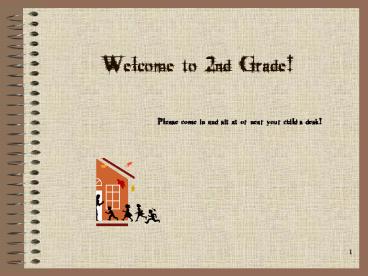Welcome to 2nd Grade - PowerPoint PPT Presentation
1 / 16
Title:
Welcome to 2nd Grade
Description:
Many children love the combination of writing and illustrating that leads to ... Lesson ( a letter will always accompany this activity) and read for 20 minutes ... – PowerPoint PPT presentation
Number of Views:29
Avg rating:3.0/5.0
Title: Welcome to 2nd Grade
1
Welcome to 2nd Grade!
Please come in and sit at or near your childs
desk!
2
Mrs. Haloftis Introduction
- Bachelors for University of Arizona
- Masters for Northern Arizona University
- Taught for 15 years/ 11 in 2nd grade
- Arizona Endorsements
- Early Childhood
- SEI
3
Classroom Expectations
- Be Respectful
- Be Responsible
- Be Safe
- Road to Success
- Children earn on a behavior chart. At
completion of the chart children are rewarded.
4
My Web Page
- http//www.amphi.com/teachers/heliopouloshalo/
- Things you can find here
- Weekly Homework Packets
- Class Information
- Monthly Book Projects
- Extension
- Word List for the week
- Monthly Reading Log (Starts in September)
- Review at home questions
- Volunteer Form
5
Four Blocks
- A Balanced Literacy Program to Meet the Diverse
Needs of All Students - The Four-Blocks Literacy Model is a multilevel,
balanced literacy framework that incorporates
four different approaches each day to teach
children how to become better readers, writers,
and spellers. Developed by Drs. Patricia
Cunningham and Dorothy Hall, this model
acknowledges that not all children learn in the
same way and provides substantial instruction to
support the learning personalities of all
students.
6
The Blocks
- Working with Words
- Writing
- Guided Reading
- Self-Selected Reading
7
Working With Words
- The purpose of this block is to ensure that
children read, spell, and use high-frequency
words correctly, and that they learn the patterns
necessary for decoding and spelling.
8
Writing
- Another way children learn to read is by writing.
For some children, their own writing provides the
first successful reading experience. Many
children love the combination of writing and
illustrating that leads to a published work.
Children's writing samples, prior to the
publication stage, serve as a rich portrait of
how well young minds are applying important
language skills and strategies, as well as what
they know about words.
9
Guided Reading
In Guided Reading, teachers choose material for
children to read and a purpose for reading, and
then guide them to use reading strategies needed
for that material and that purpose. Teachers
provide guidance in a variety of whole class,
small group, and partner formats. Guided Reading
is always focused on comprehension. Children
learn to predict what might happen or what they
might learn. They learn about the story elements
of characters, setting, and plot, and they learn
how to organize and compare information learned
from informational text.
Guided Reading is always focused on
comprehension. Children learn to predict what
might happen or what they might learn. They learn
about the story elements of characters, setting,
and plot, and they learn how to organize and
compare information learned from informational
text.
10
Self-Selected Reading
Children who have been read to regularly and who
have time each day to read books will become
readers. Readers are not just people who CAN
readreaders are people who DO read! In years
gone by, the Self-Selected Reading Block was
usually done at home! For most children, this is
no longer true. Our Self-Selected Reading Block
ensures that all children experience daily
read-alouds and time for reading books of their
choice and on their own level.
11
Sitton Spelling Program
- Spelling is a skill of basic communication.
- Spelling can be enhanced by reading and
writing . - No Excuse Words (high written words ) Children
should have these memorized. - Core Words (High-frequency words)
- No Friday spelling test
- Word Families (ex. Shed, bed , Ned, )
- Spelling and Writing go hand and hand. Writing
stories, journals, letters, and research paper
give children opportunities to use their spelling
skills.
12
Everyday Math
- Students acquire knowledge and skills, and
develop an understanding of mathematics from
their own experience. Mathematics is more
meaningful when it is rooted in real life
contexts and situations, and when children are
given the opportunity to become actively involved
in learning. - Daily Oral Math and Homelinks will be completed
in class!
13
Overview Of Science and Social Studies
1st Quarter-All about Me In 2nd Grade/ Building
Our Classroom CommunityPilgrims/Early Colonial
Life2nd Quarter and 3rd Quarter- Systems of the
Human BodyCivil Rights MLK Research/Research
Paper Mini Unit on Japan and China 4th Quarter-
Presidents Flag US History Mini Unit on Weather
14
Art, Music, and Physical
Education Art, Music, and Physical
Education will be taught weekly for the entire
year.
15
Monthly Reading Logs
- Children at the 2nd grade level are required to
read 20 minutes a night (Monday to Thursday). - The 80 minutes a week can be logged on your
monthly reading log located in your childs take
home note book! - The 1st school day of each month the log will be
collected for a reading grade. - A parent signature is required.
16
Thank you for coming have a
wonderful night!































